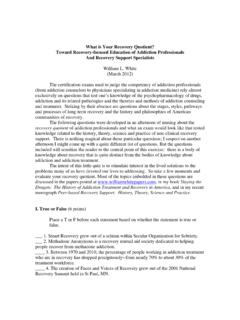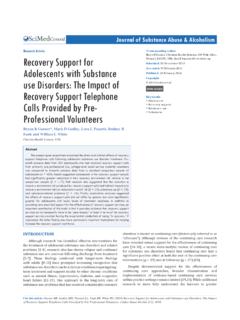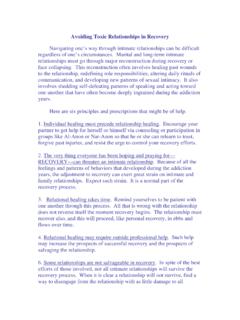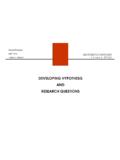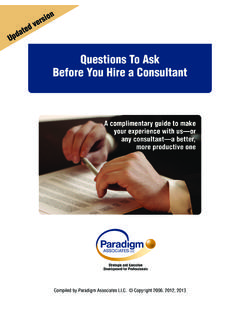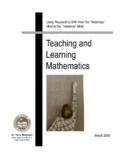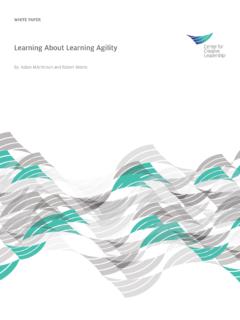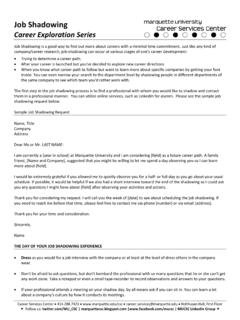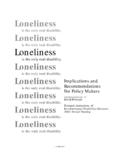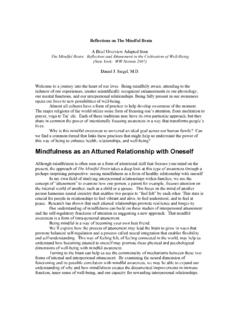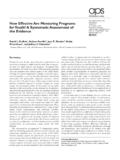Transcription of Parenting in the Context of Addiction Recovery
1 White, W., Arria, A. & Moe, J. (2011). Parenting in the Context of Addiction Recovery : Critical research questions. Posted at and COMMENTARY Parenting in the Context of Addiction Recovery : Critical research Questions William L. White, MA, Amelia Arria, PhD, and Jerry Moe, MA Abstract The emergence of Recovery as an organizing paradigm in the addictions field is spurring calls for the development of a national Recovery research agenda. This article identifies research questions of great concern to parents in Recovery , parents of recovering adolescents, Addiction professionals, and Recovery support specialists seeking to include parent-focused interventions within the treatment and post-treatment Recovery support process. Effectively addressing Parenting as a treatment and Recovery support issue will require mobilizing people in Recovery to help shape a Recovery research agenda that includes Parenting as a prominent focus of research activity.
2 research related to alcohol and other drug (AOD) problems has evolved topically through three organizing paradigms: 1) a pathology paradigm (studies of the etiology, epidemiology, personal course, and social costs of AOD problems), 2) an intervention paradigm (studies to evaluate the effectiveness of prevention, early intervention, and treatment approaches), and 3) an emerging resilience and Recovery paradigm (studies to elucidate resistance to and resolution of AOD problems; White, 2005, 2008). research studies flowing from the first two of these governing paradigms have produced an impressive body of knowledge about the causes and consequences of AOD problems and the relative effectiveness of various professional interventions to address these problems. In spite of such advances, we as a professional field and a country know surprisingly little about people with substantial personal and environmental risk factors for developing severe AOD problems but who do not develop such problems.
3 1 Moreover, we know very little about the prevalence and natural history of Recovery in the general population. Finally, there is a scarcity of data regarding the frameworks used to describe Recovery ( , secular, spiritual, religious; natural, professionally-assisted, peer-assisted) and the patterns and processes of long-term personal and family Recovery from severe AOD problems (Laudet, 2008). The purpose of this article, the fifth in a series of papers advocating the development of a national Recovery research agenda (Erickson & White, 2009; White & Chaney, 2008; White & Godley, 2007; White & Schulstad, 2009), is to identify research questions of great concern to parents in Recovery , parents of recovering adolescents, and Addiction professionals and Recovery support specialists interested in parent-focused interventions within the treatment and post-treatment Recovery support process.
4 Parents in Recovery Parental AOD problems can exert a potentially profound influence on family health and the developmental trajectory of children (Brook et al., 2010; Brown & Lewis, 1999; Chassin, Flora, & King, 2004; Eiden, Colder, Edwards, & Leonard, 2009; Hussong, Flora, Curran, Chassin, & Zucker, 2008; Keller, Cummings, Davies, & Mitchell, 2008; King et al., 2009; Marmorstein, Iacono, & McGue, 2009; White & Savage, 2005). Children raised by parents with such problems manifest widely diverse responses, with some revealing remarkable resilience under the worst circumstances while others exhibit significant problems in their development. The harmful influence of parental AOD problems is thought to be exerted through such mechanisms as pre- and post-natal AOD exposure, inadequate bonding and nurturing, disruption of family rituals, family conflict, inadequate monitoring and supervision, and physical and emotional neglect/abandonment (Arria, Moe, & Winters, 2010a).
5 While the pathology literature (studies of the effects of parental Addiction on child development) is voluminous (for recent representative literature, see Bijttebier, Goethals, & Ansoms, 2006; Coyer, 2003; El-Sheikh & Flanagan, 2001; Johnson & Leff, 1999; McLaughlin et al., 2010), few studies have been conducted to explore the effects of parental Recovery on child development and more specifically, the effects of Parenting style on the prevalence and severity of AOD problems in children of recovering parents (Smith & Hall, 2008). While there are studies that are cause for optimism on these and related issues (Andreas & O Farrell, 2007; Andreas, O Farrell, & Fals-Stewart, 2006; Koning, van den Eijnden, Engels, 2 Verdurmen, & Vollebergh, 2011; Mares, van der Vorst, Engels, & Lichtwarck-Aschoff, 2011; Moos & Billings, 1982; Reimuller, Shadur, & Hussong, 2011), definitive answers have yet to be formulated for numerous questions raised by parents in Recovery .
6 Because of the authors tenure in the addictions field and our known interest in Parenting and children s issues, we are frequently presented with questions like the following. Assessing Vulnerability Are my children at increased vulnerability for the development of AOD problems because of my Addiction ? Does the vulnerability of children vary by the type of parental Addiction ( , alcoholism versus heroin Addiction )? Is the source of this vulnerability fixed (beyond parental, peer, or professional influence) or fluid (amenable to parental, peer, or professional influence over time)? Are there indicators that would tell me which of my children might be at greatest vulnerability and in need of special support? Should I be more vigilant during particular periods of development, such as during adolescence? Does my Recovery status or my spouse/partner s Recovery status influence my child s vulnerability or potential prognosis for Recovery ?
7 Understanding Parenting in Context of Recovery What changes in my family and my children should I anticipate following initiation of my Recovery ? At what stage of Recovery are the problems that developed in my relationships with my children during my Addiction likely to dissipate? When will things get better? How do Parenting concerns differ across the stages of Recovery and across the developmental ages of children? What are the most common Parenting mistakes made by parents in Recovery ? Are there special Parenting issues for fathers in Recovery ? Should parents who abandoned their children during their active Addiction seek to re-establish contact with their children? (Will this harm or benefit the child?) If so, when and how? 3 Communicating with Children about a Parent s Recovery Should I talk about my Recovery to my children?
8 If so, when and how? When my children hear that Addiction is a chronically relapsing disease, they fear I will return to using. What should I tell them? I was in Recovery before any of my children were born. Do I need to tell them about my Addiction / Recovery history? How can I best prevent embarrassment of my children potentially resulting from my Addiction / Recovery history? My children sometimes resent the amount of time I am not available to them due to my Recovery support meetings and Recovery service work. How is such resentment best avoided or managed? My children did not live with me during the later stages of my Addiction , and I am now trying to rebuild these relationships. What actions on my part will be most effective in this process? Reducing Vulnerability and Enhancing Resiliency Are there any Parenting interventions that can lower this vulnerability or that could enhance prognosis for early and full Recovery if my child would develop an AOD problem?
9 How should I respond to early alcohol or drug use by my children? There is a history of severe AOD problems in my family going back at least four generations. What can I do as a parent to help break this intergenerational cycle? My child has been diagnosed with ADHD and prescribed stimulants. Given the family history of Addiction , will this increase his/her risk of developing a drug problem? Should I let my children s physician know that I am concerned about their heightened risk for Addiction ? Scientific studies exist that shed light on some of these questions, yet for others, the research is sparse or non-existent. Even in the former case, existing studies have not been synthesized and communicated in venues that are accessible and conveyed in a language understandable to parents in Recovery . 4 Parents with a Child in Recovery Parenting concerns also extend to parents who are themselves not in Recovery but who have a child in Recovery .
10 Some of the more common questions we are presented with in this situation include the following. Understanding Adolescent Recovery and Related Risks Are there predictable stages of Recovery for adolescents and young adults? I have four children, the oldest of whom is now in Recovery . Are my younger children at risk for similar problems because of their older sibling s Addiction / Recovery status? My child just completed adolescent Addiction treatment. What is her risk of relapse? When, if ever, will the risk of relapse for my child end or at least subside? Will my son have to go to AA/NA or other Recovery support meetings for the rest of his life? I worry that my child s Addiction / Recovery history could be a cause for discrimination and limit her potential in later life due to the stigma and misconceptions attached to Addiction .
